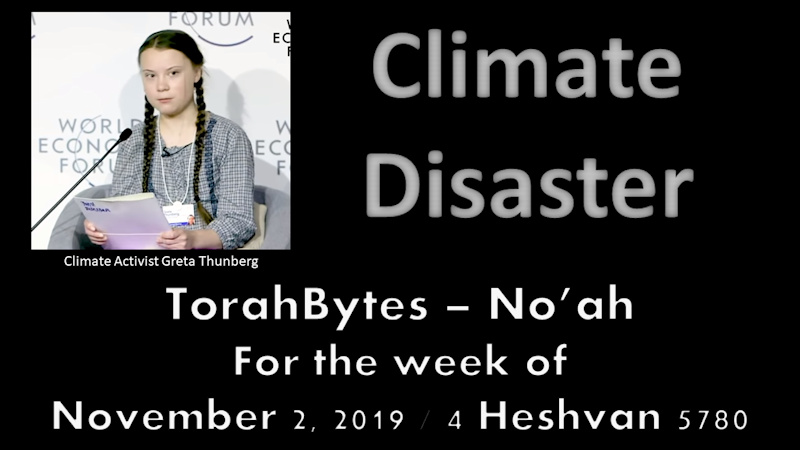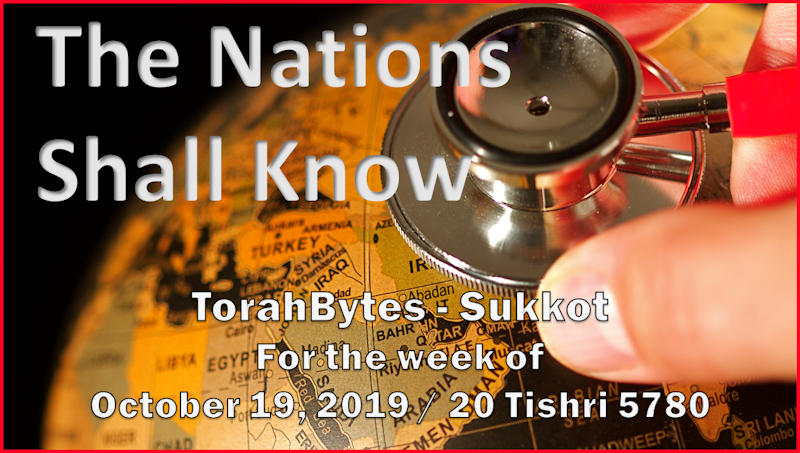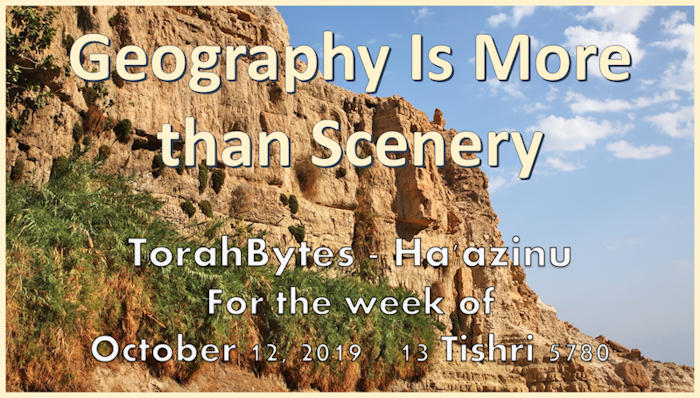For the week of November 2, 2019 / 4 Heshvan 5780
No’ah
Torah: Bereshit/Genesis 6:9 – 11:32
Haftarah: Isaiah 54:1 – 55:5
Download Audio [Right click link to download]
And God said to Noah, “I have determined to make an end of all flesh, for the earth is filled with violence through them. Behold, I will destroy them with the earth. (Bereshit/Genesis 6:13)
A few years ago, I was at a family gathering, chatting with a relative who recently had his first child. I don’t remember how it came up, but he expressed great fear about his child’s future due to the looming climate crisis. That was the first time I had encountered such emotion over what has, since then, turned into a frenzy. As sixteen-year-old Swedish activist Greta Thunberg has said: “I don’t want you to be hopeful. I want you to panic. I want you to feel the fear I feel every day. And then I want you to act. I want you to act as you would in a crisis. I want you to act as if our house is on fire. Because it is.”
My reaction to my relative’s panic years ago was along the lines of “Don’t worry; it’ll be okay.” How ironic, I thought. My immediate family are the only believers in our whole clan on both sides. Everyone else is somewhere on the agnostic/atheist spectrum. It wasn’t that long ago that disaster predictions were the sole domain of religious folks. Remember images of prophetic wannabees waving placards blazoned with messages, like “Prepare to meet thy Maker” or “The world will end in forty days”? Back then it was secular materialists shrugging off such gloom and doom in the name of scientific knowhow and technological progress. No more! The roles are reversed. It is secularists who are predicting the end of the world as we know it; while many believers like me are calling for calm. But should we be calm?
Climate disaster is not new to our planet. Neither is it new to the Scriptures. This week’s parsha (Torah reading portion) records history’s most destructive event, weather or otherwise, when God rebooted his creation through a flood that destroyed all air breathing creatures except for Noah, his family, and the animals on the ark.
This climate disaster reflects the biblical principle of the relationship between human behavior and the environment. Where I agree with the climate prophets is we can’t treat our world anyway we like and expect everything to always and forever be okay. Where we differ is that there is more to this, not less, than the burning of fossil fuels and greenhouse gasses. While as stewards of the planet (see Bereshit/Genesis 1:26-27), it’s essential to keep watch over what we put into the air, the effects of our lifestyles are the results, not of the cars and factories per se, but of the values behind how we live.
Activists and some political leaders claim if we would only adjust emissions, we may be able to avert climate disaster. But until we are willing to look seriously at what actually fuels (pun intended) our way of life, the coming disaster will not be averted. When will we take a serious look at the consumerism and greed that controls much of world economy today? I am not simply referring to billion-dollar corporations here. Big business cannot succeed without the everyday consumer. The rich can take great pride in their ability to purchase carbon offsets for their lavish lifestyles while the poor bear the burden of oppressive taxation. All the while the great polluting nations of the world continue to poison the atmosphere and water. The western world won’t get in the way of countries that have become manufacturing empires, because we want their inexpensive goods.
And that’s just one piece of a most troubling puzzle. The current obsession over climate is a convenient distraction from the grave issues plaguing the planet. It’s a lot easier to take off from work or school to attend a climate strike, than it is to effectively address destructive forces such as family breakdown, identity confusion, pornography, and abortion.
Perhaps changing climate will have disastrous effects on our planet, but it’s the social climate that should concern us the most. Not only is it something that you and I can address right now, the benefits are world changing.
Scriptures taken from the English Standard Version




